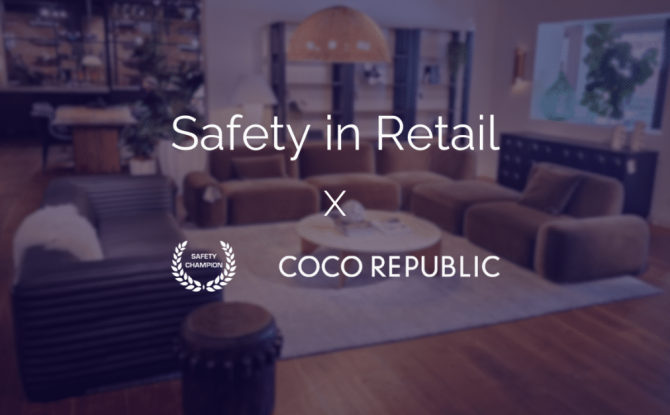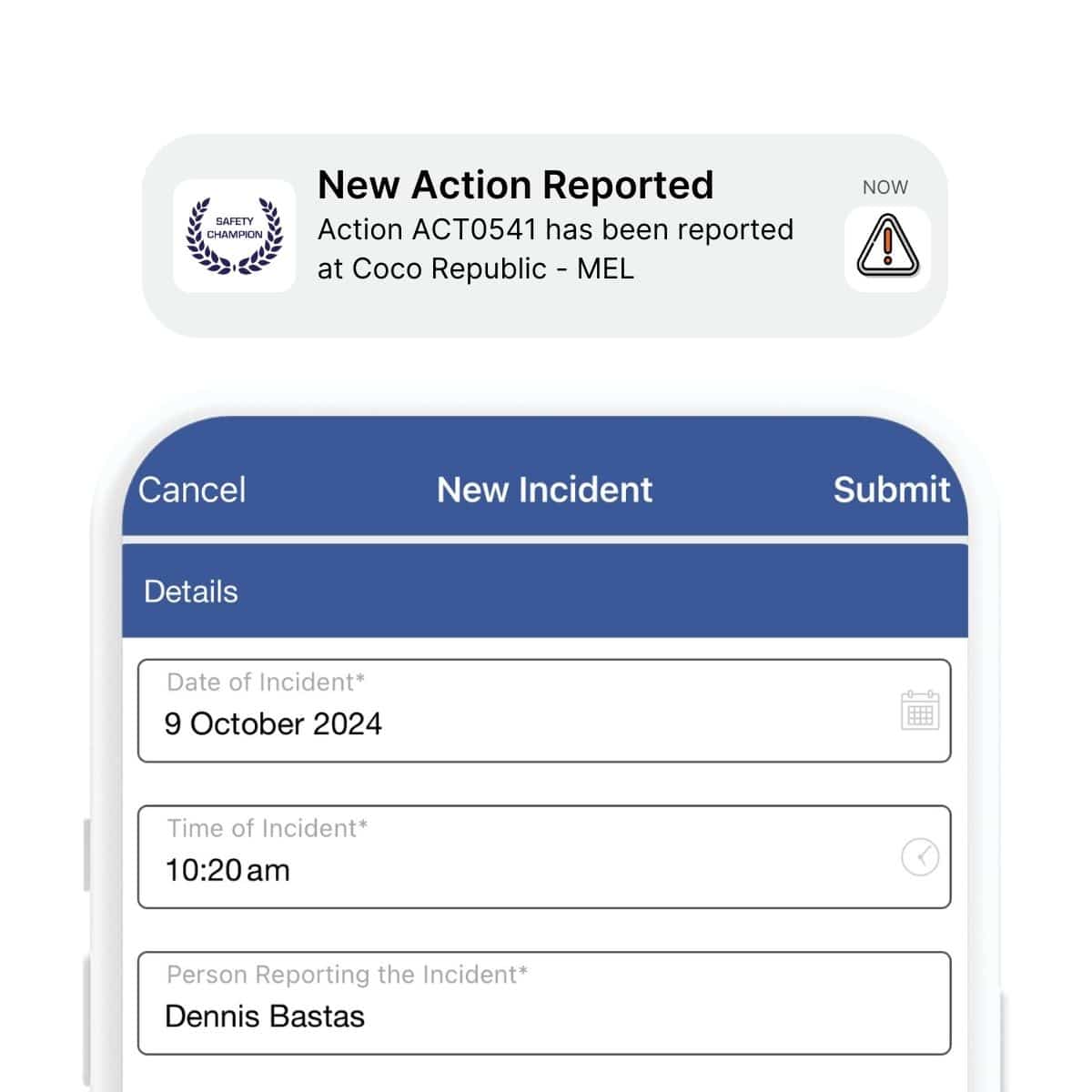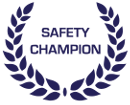
Safety in Retail: Insights and Learnings from the Industry
The retail industry is a dynamic and fast-paced environment that presents unique challenges when it comes to maintaining safety for workers. From handling heavy merchandise to managing customer interactions, Safety in retail faces different risks and hazards.
In a recent conversation with Dennis Bastas, Head of HR at Coco Republic, we discussed key industry insights alongside reports from Safe Work Australia, comparing them with real-world challenges businesses often encounter in the retail sector. This blog offers a deeper dive into those key insights and learnings from the industry to help you navigate the complex landscape of workplace safety in retail.
Understanding the Risks: What Retail Workers Face
Retail workers are exposed to a wide range of hazards that can result in both physical and psychological injuries. According to recent injury claims, the most common injuries in retail include:
- Back Injuries (26%): Often caused by lifting or handling heavy items, repetitive work, awkward postures, slips, trips, and falls.
- Shoulder Injuries (15%): Frequently result from similar activities, such as lifting and repetitive movements in awkward positions.
- Hand and Finger Injuries (9%): Include lacerations, amputations, and fractures, typically from handling sharp objects or machinery.
- Psychological Injuries (8%): Stemming from work-related stress, violence, bullying, and high work pressure, these injuries are less visible but equally damaging.
Work-Related Violence: A significant concern in the retail sector is work-related violence, which includes any incident where a worker is abused, threatened, or assaulted in circumstances related to their job. This violence can lead to both physical harm and psychological trauma, creating a ripple effect that impacts not just the individual worker, but also their families, the business, and the community at large.
Shared Responsibility: Ensuring safety in retail is a shared responsibility. Everyone in the workplace, from frontline employees to management, has a role in safeguarding both physical and psychological health. This includes taking proactive steps to minimise risks and creating a culture where safety is a priority.
Consequences of Neglecting Safety: Failing to manage these risks can lead to severe consequences, including injury, long-term health issues, and even economic losses for businesses due to reduced productivity and increased compensation claims. It’s crucial to recognise that all health and safety risks must be managed with the same level of seriousness.
Challenges in the Retail Industry
Retail environments are inherently challenging due to their customer-facing nature and the physical demands placed on workers. Some of the key challenges include:
- High Employee Turnover
- Varied Risk Factor
- Customer Interactions
- Limited Resources
However, there is more to consider than common industry challenges. For Dennis and Coco Republic Challenges take on a different meaning.
What specific challenges related to employee safety have you observed in your retail operations?
One of the major challenges in retail safety is that it’s often treated as a “tick and flick” exercise. Safety becomes secondary to meeting sales targets, which undermines efforts to create a secure workplace. To address this, safety must be viewed as integral to daily operations, not an afterthought.
A crucial part of shifting this mindset is ensuring employees understand the ‘why’ behind safety measures. When workers recognise how these processes protect them and benefit the business, engagement increases. Leadership also plays a vital role by consistently treating safety with the same importance as sales performance. Without regular emphasis on safety, it won’t become embedded in the culture.
Simplifying safety procedures is another key aspect, as overly complex systems often discourage compliance. Collaboration across departments, including supply chain and merchandising, is essential to creating a cohesive safety strategy. By aligning all teams with safety priorities, companies can foster a workplace where safety is part of the culture.

Dennis Bastas
Head of HR / Coco RepublicSafety shouldn’t be an afterthought. When leaders prioritise it and teams collaborate, it becomes part of a company’s DNA.
How do customer interactions influence the safety protocols you have in place?
Customer interactions significantly impact the safety protocols implemented in retail environments. While keeping employees safe is a priority, ensuring customer safety is equally critical. Every customer should feel confident that they are in a safe environment when shopping, interacting with staff, or exploring displays.
Safety protocols are designed to protect both employees and customers. For example, product displays and floor layouts not only consider aesthetics but also customer flow, accessibility, and potential hazards. Regular risk assessments help identify issues, like tripping hazards or blocked emergency exits, ensuring a proactive approach to safety.
Handling customer behavior during high-traffic periods, such as holiday sales, presents additional challenges. Teams are trained in internal safety procedures and how to guide customers through safety protocols, such as maintaining clear walkways or managing emergencies.
Safety considerations also extend to product handling and in-store demonstrations. Collaboration with merchandising and logistics ensures that products are displayed and delivered in ways that prevent injuries. Additionally, teams are trained in first aid and emergency procedures to assist customers in case of incidents, building trust and responsibility.

Dennis Bastas
Head of HR / Coco RepublicOur goal is to embed safety into every customer interaction, ensuring that everyone feels protected and supported at all times.
Actions Taken to Address These Challenges
To combat these challenges, many retailers are implementing targeted strategies aimed at reducing risks and enhancing safety:
- Enhanced Training Programs
- Ergonomic Improvements
- Incident Reporting Systems
- Psychological Support
It is also important to consider the specific challenges a business can face to develop tailored and accurate strategies. We asked Dennis:
Which specific actions has your company taken to improve safety for your retail employees?
Several targeted actions have been implemented to improve both physical safety and psychological well-being for the team. One of the most impactful changes has been adopting the Safety Champion software, which has streamlined incident and hazard reporting across all locations. The integration of safety checklists has simplified processes, making safety an effortless part of daily operations rather than an additional burden.
In logistics, addressing manual handling risks was crucial, particularly in pallet wrapping. Introducing a pallet wrapping machine has significantly reduced physical hazards, improving safety and morale in the logistics team. Beyond physical safety, psychological well-being is also a priority. A culture where employees feel safe voicing concerns, ideas, and issues has been fostered through regular engagement surveys and one-on-one check-ins.
Looking ahead, the focus for the next 12 months is on enhancing the safety training and compliance framework. This involves a more engaging training program that ensures team members not only understand safety protocols but also feel confident in applying them. Compliance monitoring will be strengthened to ensure consistency across all locations, reinforcing the safety-first culture.

Dennis Bastas
Head of HR / Coco RepublicBy streamlining safety processes and encouraging open dialogue, we’re building a culture where safety is second nature.
From a software perspective, we are proud that our Incident Reporting Module supports businesses by allowing every workforce member to report incidents in real time, notifying all relevant stakeholders instantly via email, push, or SMS. This automated response system removes the need for manual follow-ups, enabling the safety manager to focus on supporting their people or managing the incident as it unfolds.

What measures have you implemented to address both physical and psychological hazards in your stores?
A range of safety measures focusing on key metrics, training, and culture have been implemented to address both physical and psychological hazards in the showrooms. The Lost Time Injury Frequency Rate (LTIFR) is closely monitored to track the frequency of injuries that result in employees needing time off work. This, along with tracking monthly incidents and hazard reports through Safety Champion software, allows the company to proactively identify and address risks before they cause harm.
Psychological safety is also prioritised, with regular employee surveys measuring engagement scores related to safety. High engagement scores indicate that employees trust safety processes and feel confident, raising concerns about both physical and mental health risks. Training is equally critical, and completion rates are monitored to ensure that all employees are equipped to maintain a safe environment.
Together, these measures provide a comprehensive approach to maintaining a safe and supportive workplace.

Dennis Bastas
Head of HR / Coco RepublicBy monitoring key metrics and fostering a culture of engagement, we ensure that safety remains a top priority across our showrooms.
Looking Ahead: Long-Term Safety Goals in Retail
Creating a safer retail environment is an ongoing effort that requires a commitment to continuous improvement. For many businesses, long-term goals may include:
- Building a Safety Culture
- Leveraging Technology
- Regular Audits and Assessments
- Collaboration and Sharing Best Practices
To Coco republic, as a leader in their category, long-term goals have been refined to enhance safety across all departments.
What are your company’s long-term goals?
Coco Republic’s long-term safety goals focus on creating a fully integrated safety culture across all business operations. Expanding the use of the Safety Champion software is a priority, with the aim to increase user engagement. The company is focused on ensuring that employees confidently and proactively use the tool to report risks before incidents occur. By analysing gathered data, Coco Republic intends to refine safety strategies, identifying trends and areas for improvement.
A key goal is to enhance safety training initiatives. Moving beyond compliance, the company plans to develop a more comprehensive training framework that covers both physical and psychological safety. This approach ensures that training remains relevant and practical, embedded across all levels of the organisation.
Additionally, the company aims to strengthen communication about safety expectations and progress throughout the entire business. This includes embedding safety into everyday conversations, from team meetings to one-on-one check-ins. Keeping safety top of mind will help make it a core aspect of the company’s culture.
Collaboration across departments will also be deepened, aligning safety processes with the work of teams like logistics and merchandise. By working together, Coco Republic will build a cohesive safety strategy that supports both physical and psychological well-being.

Dennis Bastas
Head of HR / Coco RepublicOur goal is to integrate safety into every part of the business, making it an essential aspect of our culture and daily operations.
More insights tailored to your business
Safety in retail is a complex and multifaceted challenge that requires a proactive approach from everyone involved. By understanding the risks, taking targeted actions, and setting clear long-term goals, any business in the retail industry can create safer workplaces that protect both employees and customers.
As part of the Safe Work Month, we have partnered with Coco Republic to host and discuss more about Safety in Retail. Attendees will gain key insights from a panel discussion featuring Dennis Bastas, Head of HR at Coco Republic, and Craig Salter, Founder of Safety Champion Software.
Don’t miss out on the opportunity to stay informed about the latest trends, challenges, and solutions in workplace health and safety within the retail sector. Whether you want to enhance your WHS strategies, stay compliant with new regulations, or simply connect with peers, this event offers it all.
Did you enjoy the article? We would like to collaborate with you and your business. Get in touch with us.





